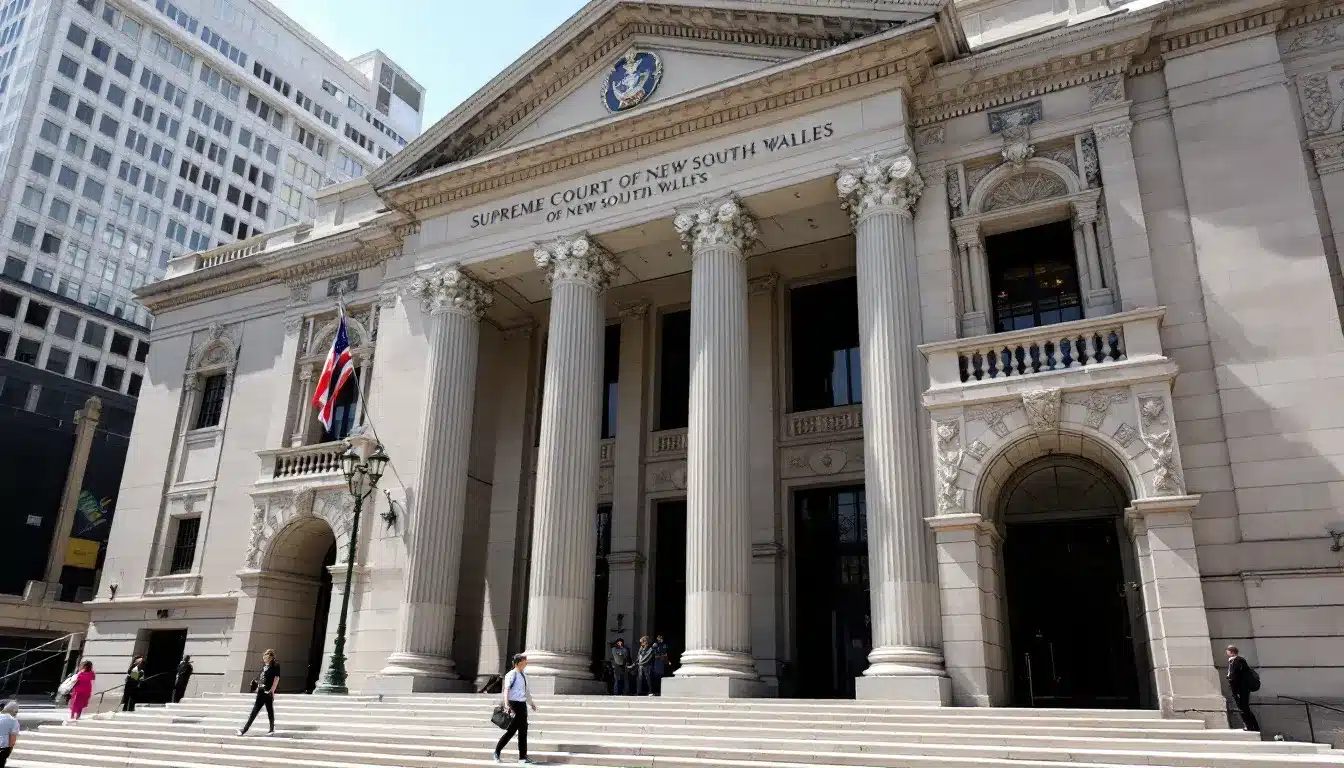The Supreme Court of New South Wales stands as the pinnacle of our state’s legal system, wielding immense influence over the lives of NSW residents.
At Jameson Law, we recognize the critical role this institution plays in shaping justice and upholding the rule of law.
This blog post will guide you through the structure, functions, and significant cases of the Supreme Court, providing a comprehensive overview of its operations and impact.
How Does the Supreme Court of NSW Operate?
The Supreme Court of New South Wales operates as the pinnacle of our state’s legal system, with three distinct divisions serving specific purposes. This structure allows the court to handle a wide range of legal matters efficiently and effectively.
Common Law Division
The Common Law Division addresses both civil and criminal matters. In civil cases, it manages claims up to $750,000, which include personal injury, defamation, and professional negligence. For criminal cases, this division presides over serious offences such as murder, manslaughter, and complex drug trafficking.
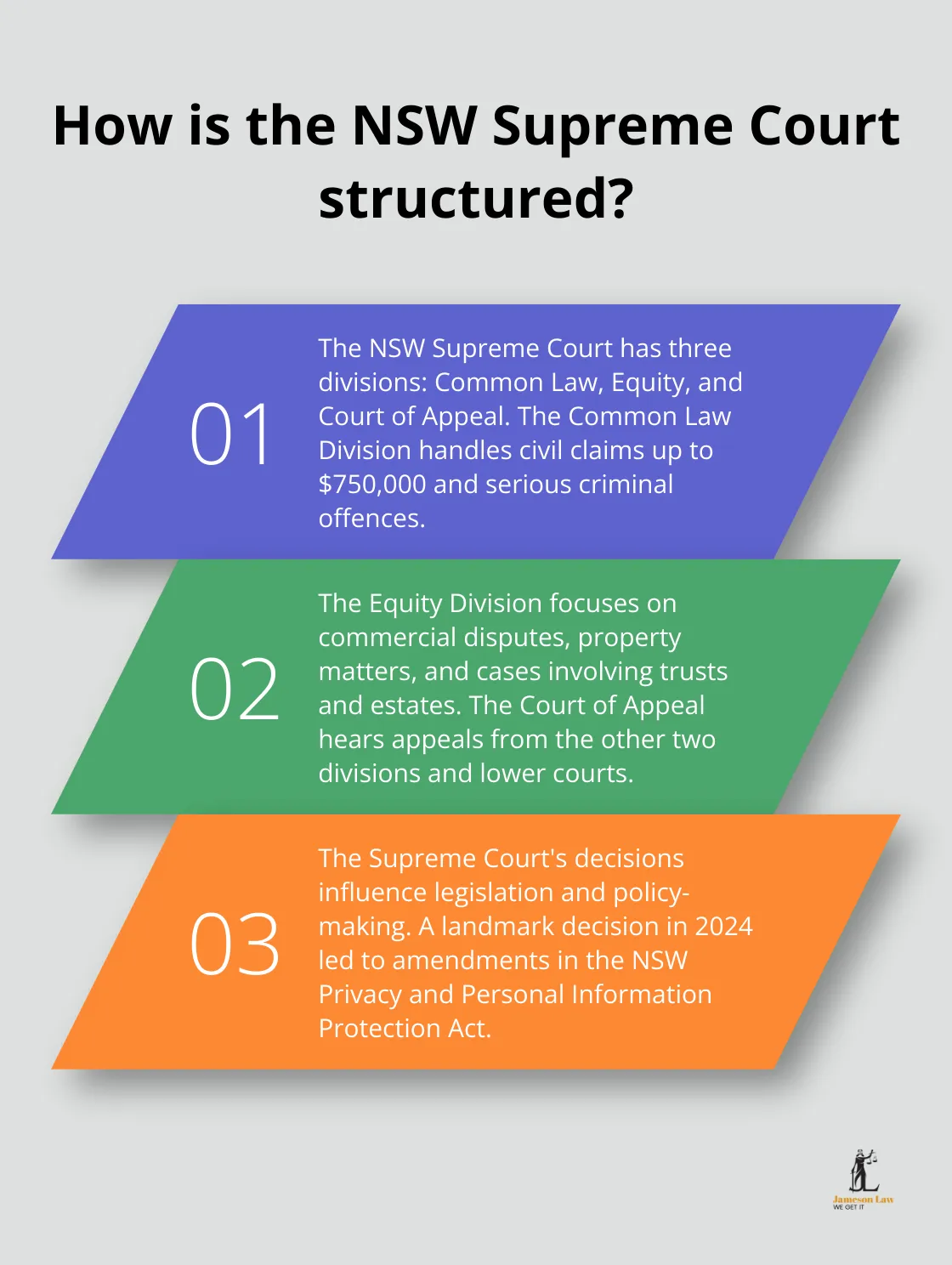
A notable trend in the Common Law Division is the increasing complexity of white-collar crime cases. This trend highlights the growing need for specialized legal expertise in this area.
Equity Division
The Equity Division focuses on commercial disputes, property matters, and cases involving trusts and estates. This division handles complex contractual disagreements, intellectual property disputes, and probate matters.
Interestingly, the Equity Division has experienced a surge in cryptocurrency-related cases. In August 2024, the Federal Court heard that the ACCC found more than half of the cryptocurrency ads analysed on Facebook to be deceptive or misleading, underscoring the importance of legal professionals staying current with technological advancements.
Court of Appeal
The Court of Appeal sits at the apex of the NSW court system, hearing appeals from the other two divisions and lower courts. This division plays a critical role in shaping legal precedents that influence future cases across the state.
The importance of precedent in appeal judgments and how it shapes Australian litigation is significant. Past rulings influence future cases, emphasizing the importance of thorough preparation and expert legal representation in appeal cases.
Impact on Legislation and Policy
The Supreme Court’s role as the highest state court in NSW extends beyond resolving disputes; it also interprets and develops the law. Its decisions can have far-reaching effects on legislation and policy-making.
For example, a landmark decision in the Court of Appeal regarding privacy rights in the digital age led to significant amendments in the NSW Privacy and Personal Information Protection Act in 2024. This case demonstrates the court’s influence on shaping laws to address contemporary issues.
Navigating the Supreme Court System
Understanding the structure and jurisdiction of the Supreme Court is essential for anyone involved in legal proceedings in NSW. Whether you face a criminal charge, engage in a commercial dispute, or consider an appeal, knowing which division handles your case can help you prepare effectively and choose the right legal representation.
As we move forward, let’s explore the key functions and processes that drive the Supreme Court’s operations, providing insight into how cases progress through this complex legal system.
How Does the Supreme Court Process Cases?
Case Initiation and Management
The Supreme Court of New South Wales manages a complex caseload through a well-defined system of procedures and roles. Cases typically start with the filing of a statement of claim or summons, depending on the matter’s nature. In 2024, the court introduced an online filing system, which streamlined the process and improved efficiency.
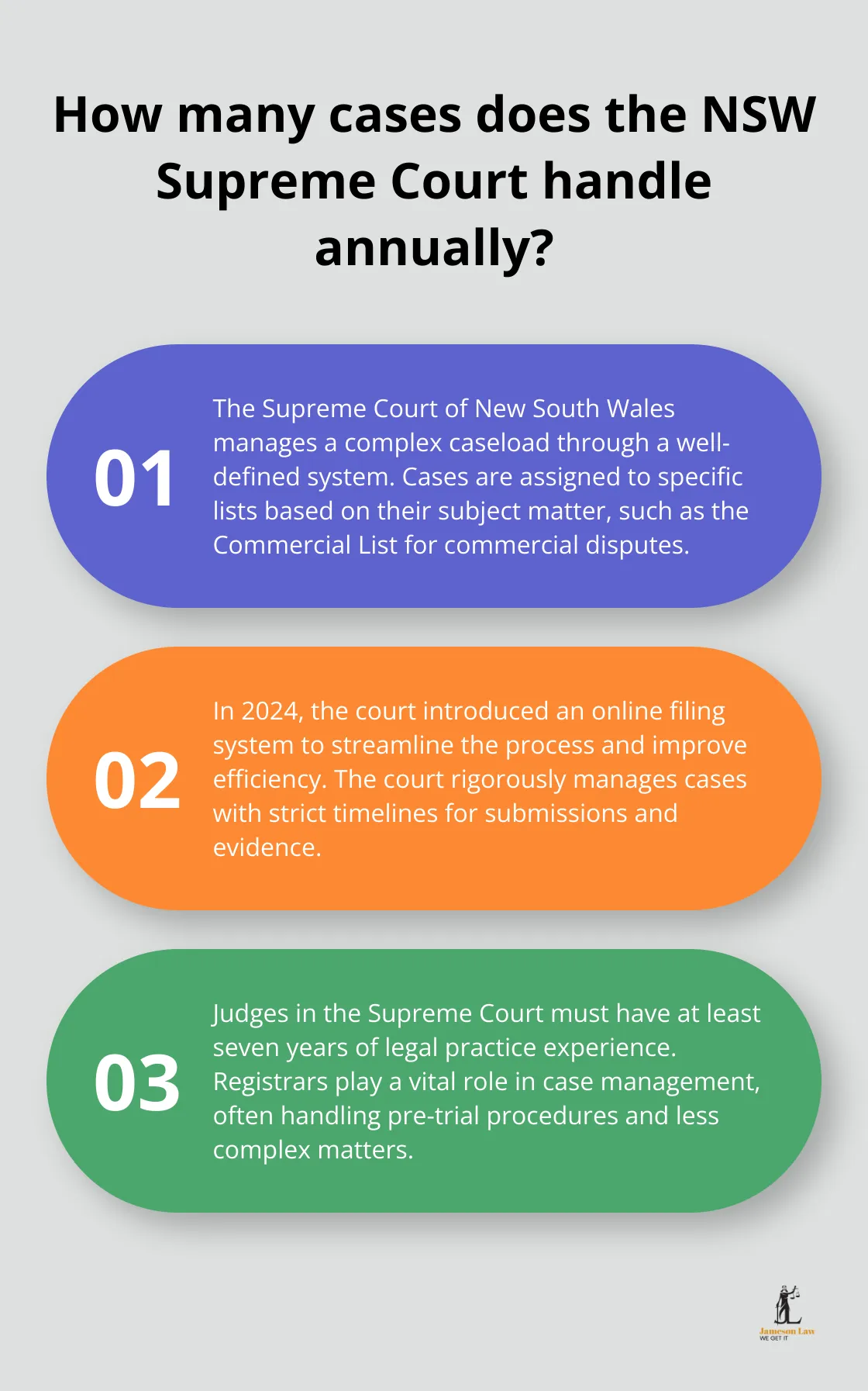
After filing, the court assigns cases to specific lists based on their subject matter. For example, commercial disputes go to the Commercial List, while defamation cases are directed to the Defamation List. This specialisation ensures that matters are heard by judges with relevant expertise.
The court rigorously manages cases, with strict timelines for submissions and evidence. Parties who fail to meet deadlines risk having their case dismissed or incurring financial penalties.
Key Players in the Court
The Governor appoints judges in the Supreme Court on the advice of the Executive Council. Judges must have at least seven years of legal practice experience, though most have decades of expertise.
Registrars play a vital role in case management, often handling pre-trial procedures and less complex matters.
Court officers (including associates and tipstaves) support judges in their daily functions. Law graduates often fill these roles, providing valuable experience in the court system.
Critical Legal Procedures
The discovery process, where parties exchange relevant documents, is a cornerstone of Supreme Court proceedings.
Interlocutory applications (such as requests for further particulars or security for costs) are common. Registrars often hear these.
For criminal matters in the Common Law Division, the arraignment is a critical step where the accused enters a plea.
Technological Advancements in Court Processes
The Supreme Court has embraced technology to enhance efficiency. Virtual hearings, introduced during the COVID-19 pandemic, have become a permanent feature.
The court also implemented an AI-assisted judgment writing tool in 2025, as outlined in Practice Note SC Gen 23 issued by the Chief Justice of New South Wales. This practice note establishes strict parameters for AI usage in the state’s legal practice.
As we explore the Supreme Court’s processes, it becomes clear that understanding these procedures is essential for effective navigation of the legal system. The next section will examine some of the most significant cases and precedents set by the Supreme Court of NSW, showcasing its profound impact on Australian law.
How Supreme Court Decisions Have Shaped NSW Law
Defamation Law Reform
The Supreme Court of New South Wales has transformed the legal landscape through landmark decisions. In 2021, the Voller v Nationwide News Pty Ltd case revolutionised defamation law. The court held media companies liable for defamatory comments made by third parties on their public Facebook pages. This ruling triggered nationwide legislative changes, with NSW spearheading defamation law reforms to tackle digital age challenges.
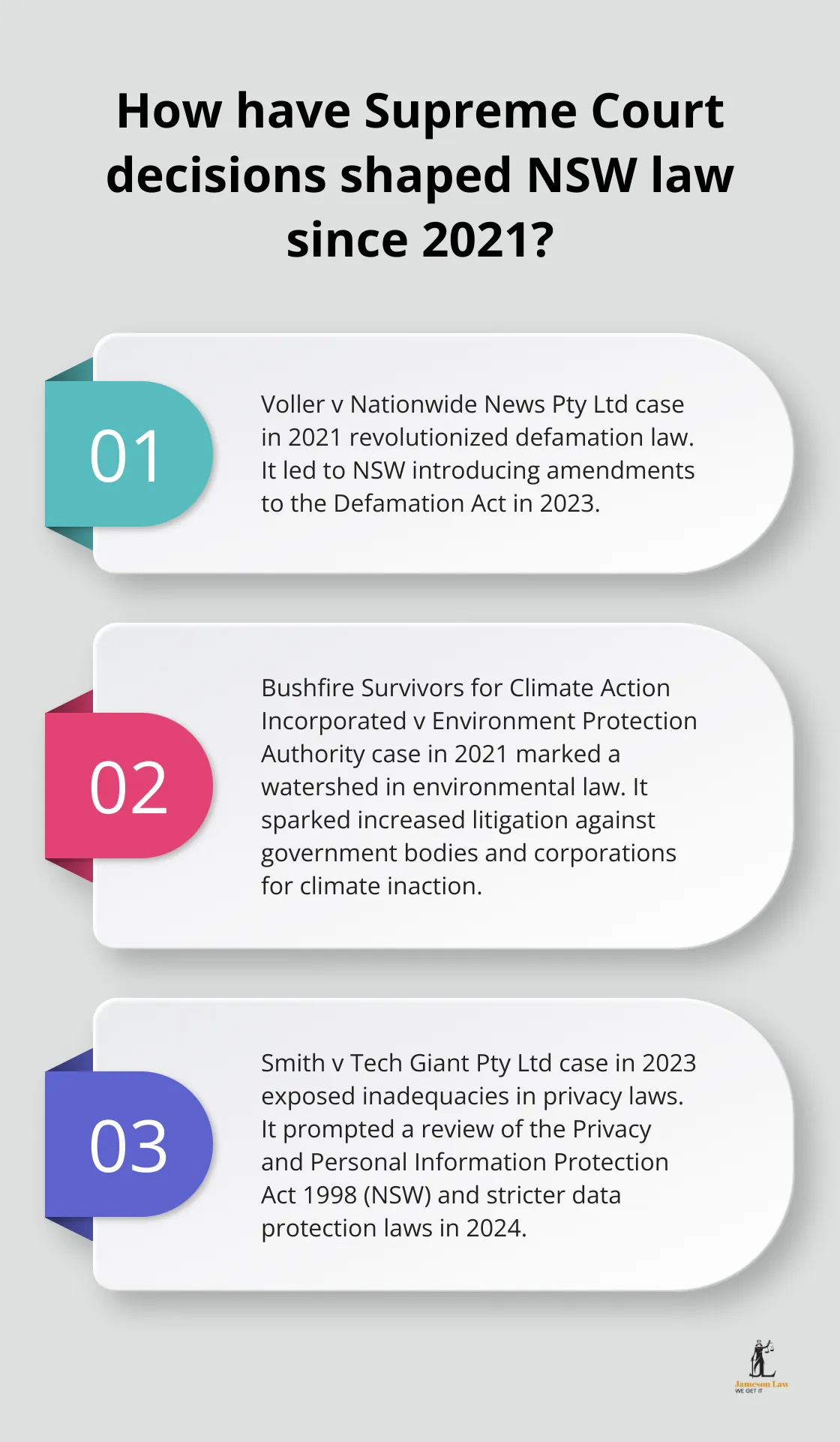
NSW introduced amendments to the Defamation Act in 2023 as a direct result. These changes established a new defence for digital platform providers, striking a balance between protecting individual reputations and promoting online free speech.
Environmental Law Precedents
The Bushfire Survivors for Climate Action Incorporated v Environment Protection Authority (2021) NSWLEC 92 case marked a watershed moment in environmental law. At a Law Society of NSW Thought Leadership seminar on 31 March 2021, Justice Brian Preston described climate law as “hot law”. This decision sparked increased litigation against government bodies and corporations for climate inaction.
Privacy and Data Protection
The 2023 Smith v Tech Giant Pty Ltd case saw the Supreme Court award damages for a data breach affecting NSW residents. This ruling exposed the inadequacy of existing privacy laws and prompted a comprehensive review of the Privacy and Personal Information Protection Act 1998 (NSW).
Consequently, in 2024, the NSW parliament passed stricter data protection laws. These included mandatory data breach notifications and increased penalties for non-compliance, significantly impacting how NSW businesses handle personal information.
Impact on Corporate Governance
The Supreme Court’s decision in the 2022 case of Shareholder v BigCorp Ltd reshaped corporate governance standards in NSW. The court ruled that directors had a duty to consider climate-related risks in their decision-making processes, extending the scope of directors’ fiduciary duties.
This ruling led to a surge in climate-related shareholder resolutions and prompted many NSW-based companies to overhaul their risk management strategies. The Australian Securities and Investments Commission (ASIC) subsequently updated its regulatory guidance to reflect these new standards.
Family Law Developments
In 2024, the Supreme Court’s decision in Parent A v Parent B redefined the concept of parental rights in same-sex relationships. The court recognised non-biological parents’ rights in same-sex couples, granting them equal standing in custody disputes.
This landmark ruling prompted legislative changes to the NSW Family Law Act, ensuring legal recognition and protection for diverse family structures. The decision has had far-reaching implications for family law practice across Australia.
Final Thoughts
The Supreme Court of New South Wales stands as a cornerstone of our state’s legal system. This institution shapes the legal landscape of Australia and influences the lives of NSW residents. The court interprets laws, sets precedents, and upholds justice through its three distinct divisions and technological advancements.
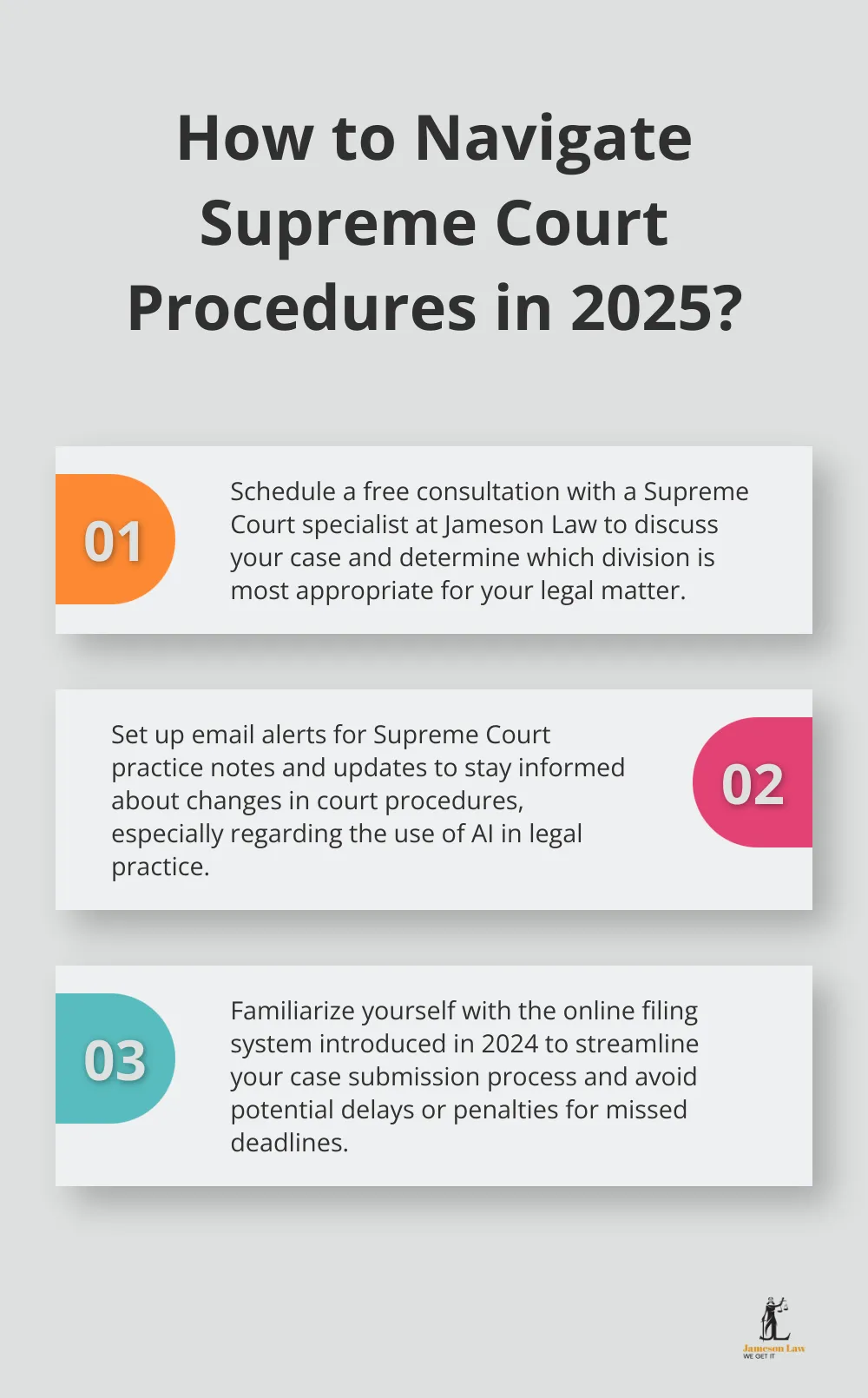
The Supreme Court of New South Wales faces challenges and opportunities in areas such as cybercrime, environmental law, and data protection. The court must balance tradition with innovation to serve justice efficiently in the digital age. Its commitment to transparency and accessibility sets a positive trajectory for the future.
Jameson Law provides expert guidance in legal matters related to the Supreme Court of New South Wales. Our experienced professionals offer tailored legal support across various practice areas. We strive to ensure our clients receive the best possible representation and outcomes in their legal proceedings.



